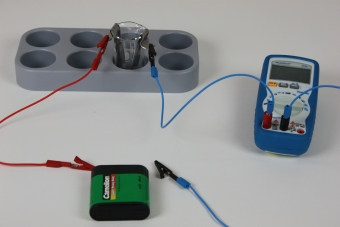Principle
There are some galvanic cells which can be quite simply be brought from the starting condition to the final condition and back again by alternately charging and discharging them. These repeatedly re-chargeable cells can so be utilized to store energy. The most well known of this type of cells is the lead accumulator, which is nowadays used in every automobile as starter battery.
In this experiment, a model of a lead accumulator is constructed in which the charging and discharging process can be observed.
Learning objectives
-
Design and function of an accumulator
Benefits
- Easy teaching and efficient learning by using interactive experimentation PHYWE-Software
- Experiment is part of a complete solution set with experiments for the topic Electrochemistry matched with international curriculum: all topics are covered




